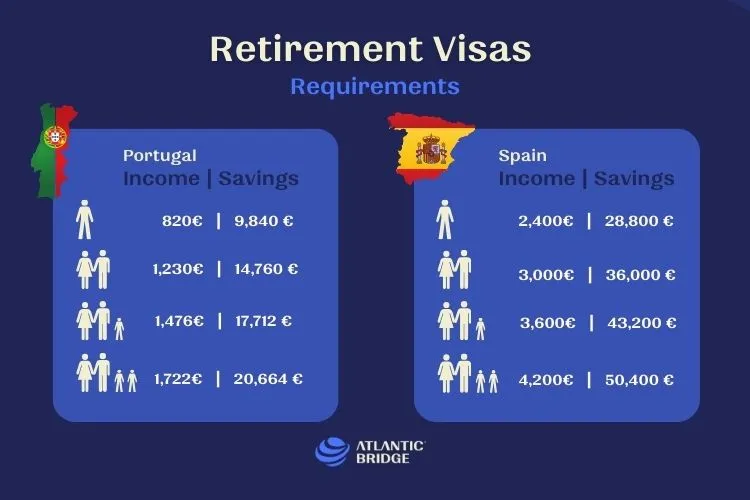23 de January, 2024

D7 Portugal Visa or Spain Non-Lucrative Visa? Which is the best visa for retirees? Which is the most suitable for you? Both Spain and Portugal offer excellent conditions for those who wish to live on passive income in these countries. We’re not just talking about quality of life and comfort but also about visas that allow legal and secure residence in either of these two places. Therefore, the question is quite common: move to Portugal or Spain? How do passive income programs differ? In the following, we will compare the two options to help you determine which is best for you.
Foreigners from outside Europe can legally live in countries like Spain and Portugal through special passive income visas, such as the D7 Visa and the Non-Lucrative Visa. These programs are ideal for retirees or individuals with incomes who want to establish residence without investing large sums in businesses or properties.
Both countries stand out as popular destinations for retirees and holders of passive incomes. In 2024, Portugal was ranked as the second-best country in the world to retire, according to a survey by International Living. In the same ranking, Spain secured the 5th position. Both countries have maintained prominent positions in this ranking for several years
See here the comparison between the cost of living in Spain and Portugal.

To qualify for either visa, you will have to prove sufficient passive income to support yourself without the need to work in the country of your choice.
Portugal
Spain
*IPREM is the Public Multi-Effects Income Indicator set at 600€ in 2024.
To apply for the visa, the applicant must prove that they can sustain themselves in the country without the need to work. Therefore, they must demonstrate financial means, in other words, having savings.
Portugal
In the Portuguese country, this savings must amount to at least €9,840.
Spain
To apply for the non-lucrative visa, you must have an amount of €28,800.
It should be noted that this amount is only for the main applicant. If the application is for a family, the values increase according to the number of dependents, following the same rules applied to incomes.
Which family members can be reunited into D7 Portugal and Non-Lucrative Spain? The rules for family reunification are quite similar in both countries and visa applications are also made jointly.
In both cases it is possible to group:
Unlike Spain, in Portugal it is possible to reunite children over the age of 18, provided they are studying and are financially dependent.
Both countries will ask for proof of identification, travel/ health insurance, and criminal record. But pay attention to the details, as there are differences:
In Portugal, you must present the criminal record certificate from the country of origin or last country of residence. For example, if the applicant is Brazilian, but has been living in Dubai for 2 years he can only present the criminal record from Dubai.
The applicant must not have convictions for crimes punishable in Portugal by a custodial sentence of more than 1 year, regardless of whether the sentence has been served or not.
It requires criminal records issued by the countries where the applicant has lived in the last 5 years.
The applicant must not have any convictions of any kind.
For the D7 Visa, the proof of means of subsistence is given through a deposit of the required amount in a current account in a Portuguese bank. That is, the applicant must open an account in a Portuguese bank.
In Spain, opening an account with a Spanish bank is not required. Proof of income can be provided in other ways, including deposit in a current account in the visa applicant’s home country.
It is necessary to issue the NIF – Número de Identificação Fiscal, which is the Portuguese tax identification number, because the document is required to open an account in a national bank.
Obtaining an NIE – Número de Identificación de Extranjero – is highly recommended and will be important for those who intend to reside in Spain. It serves as a personal identifier and tax number. Nevertheless, its presentation is not mandatory when applying for a non-lucrative visa.
Both countries require their applicants and family members to have travel/ health insurance in order to apply for a visa, with some differences:
Portugal accepts ordinary travel insurance at the time of application. Brazilians are also allowed to present the PB4. The PB4 is an agreement signed between Portugal, Cape Verde, Italy, and Brazil that establishes public health care for people who are living in these countries. It is also called as PT-BR/13, CDAM (certificate of the right to medical assistance).
Spain requires health insurance contracted with a private Spanish company, long term (valid for 1 year), with no co-payment and no ceiling. The Spanish government also requires repatriation insurance in case of death.
Portugal does not require a medical certificate, only health insurance or travel insurance.
To obtain a visa to enter Spain, the applicant needs to present a medical certificate that proves that he does not have any serious illness that could impact on the local health system or on the safety of Spanish citizens. This is a simple but mandatory certificate.
In Portugal proof of rental for a minimum period of one year is required. Invitation letters or hotel reservations are not usually accepted. Rentals made on rental platforms, such as Uniplaces or Flatio, are also valid. See here the precautions to take with your accommodation certificate and avoid issues with your visa application.
Hotel reservation or local accommodation is accepted as proof of residence for those wishing to migrate to Spain via the Non-Lucrative Visa.
Realizing your goal of living in Europe or obtaining European citizenship can be simpler than you think. We offer personalized support to make the immigration process more accessible and uncomplicated.
In Portugal, the document survey usually takes 1 to 2 months. The procedure takes more 60 days.
In Spain, the document survey process also usually takes 1 to 2 months. However, the timeframe for the consulate to evaluate the application is a little longer: 90 days.
Do you want to live in Portugal or Spain? Talk to an Expert>
D7 Visa Portugal is valid for 120 days
Non Lucrative Visa Spain valid for 90 days. It is important to note that upon arrival in Spain, the applicant has only one month to apply for residency.
In Portugal, the first RA is valid for two years. It is renewable for another two years, and then one more year. After the fifth year, it is already possible to request a permanent residence permit or Portuguese citizenship, if the RA holder meets the required requirements (see below).
In Spain, the first RA is valid for one year. It is renewable for another two years, and then another two years.
When you arrive in the country where you will reside, you must apply for a residence permit.
In Portugal, it is necessary to make a prior appointment with SEF.
In Spain, the residence permit application is made at the Oficina de Estranjeria, with no need for pre-scheduling, and in a more practical and faster way.
After living legally in Portugal for a period of 5 years the foreigner may request Portuguese citizenship.
He must have all his documentation in order, must not have been convicted and must have renewed his residence permit within the foreseen time limits. In addition, he must also undergo a Portuguese language test, in which he must demonstrate basic knowledge of the language.
In Spain, the minimum period of residence in the country, for the purpose of requesting spanish citizenship, is 10 years but can be reduced in some cases:
One important detail: in Spain, besides being required to prove an advanced level of Spanish, it is also mandatory to pass a general knowledge test about the country.
In both countries it will be necessary to prove that the applicant and his family members can support themselves without working in the country, but…
With the D7 Visa both the main applicant and his/her extended family members can work normally in Portugal to earn extra income if they wish.
The Non-Lucrative Visa does not allow paid work in Spain.
At the end of one year of residence in Spain with the Non-Lucrative Visa, it is possible to request a work permit at the time of renewing the residence authorization.
Portugal: €90
Spain: €80
Residence Permit: The amount charged for a residence permit varies according to the applicant’s country of origin.
For those who do not speak Spanish or Portuguese, it should be noted that Portugal has the advantage of having a large part of its population fluent in English, including the civil servants involved in the immigration processes. And this can be an important detail.
Portugal is the ninth most proficient country in the world in English, according to the English Proficiency Index. Spain occupies the 33rd position in the same ranking.
So? D7 Portugal Visa or Spain Non-Lucrative Visa? Which is the best visa for retirees? Let’s try to make a brief summary.
Generally speaking, Spain has a more simplified and less bureaucratic process for acquiring a visa, without requiring proof of residence or opening a bank account in the country. It is also easier to obtain a residence permit in Spain, with no queues or waiting around.
The minimum income requirement is higher in Spain (28,800/year) than in Portugal (9,840/year). Consular fees are similar.
Acquiring Portuguese citizenship is simpler, since only basic language skills are required. For those coming from non Iberian countries, it is also faster to become a national citizen in Portugal (5 years) than in Spain (10 years).
Both destinations are considered paradises for those who wish to rest, with a great climate, cultural richness, excellent gastronomy, safety, and good health services.
Now it’s your turn, what’s your choice? Spain or Portugal?
Do you want to live in Portugal or Spain? Talk to an Expert>

Author:
Atlantic Bridge

Are you considering living in Portugal as an expatriate and searching for the best education for your children? Discover here the top international schools in the country, how they operate, and their costs.
Author:
Silvia Resende
31 de January, 2024